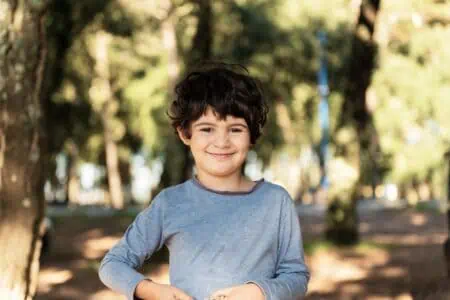While historically associated with “dandies” or admirers, the modern iteration of Beau is stripped back and cool. It rejects the fussiness of longer aristocratic names (like Beauregard) in favor of something approachable and timeless.
Verdict: Beau is an exceptional choice for a baby born in 2026. It offers the “vintage cool” of names like classic western hits but retains a softness that fits the modern trend of gentle parenting. It is a name that will age beautifully with your son, from a cute toddler “Bo-Bo” to a dashing young adult.
Beau Overview
- Meaning: Beau means “handsome” and refers to a woman’s suitor or boyfriend.
- Gender: Beau is traditionally a man’s name, but is also gender-neutral.
- Origin: From the Latin “bellus” and the French derivation meaning “handsome.”
- Pronunciation: “bo”
- Popularity: The name Beau for a boy has risen in popularity around the world and at present is #94 in the U.S.
- Nicknames: Bay, Bear, Bee, Beebee, Biff, Bo, Bobo.
- Variations: Bea (American), Beaux (French), Beaw (English), Bello (Italian), Belo (Portuguese), Bo (English), Boe (Scandinavian), Boh (English), Bou (English), Bouw (English).
- Namesakes: Beau Bennet (American hockey player); Beau Garrett (American actress); Beau Smith (American comic book writer).
What Does Beau Mean?
At its core, the name Beau is a compliment that became a title. In the French language, the word literally means “handsome” or “beautiful” in the masculine form. It derives from the Latin word bellus, which shares the same root as words like “embellish” or “beauty.”
However, the cultural meaning runs deeper than just physical appearance. In English history, specifically during the Regency era, a “Beau” wasn’t just a name; it was a noun used to describe a man of fashion, a dandy, or a wealthy suitor. A woman’s “beau” was her sweetheart or intended fiancé. It implies gallantry, courtship, and a certain level of social grace.
Today, Beau is often seen as an old-fashioned name that has shed its high-society feathers to become a symbol of rugged affection. It suggests a boy who is physically handsome, yes, but also one with a “beautiful” soul and kind temperament.
Where Does the Name Beau Come From?
The name Beau comes from the Latin roots of Western Europe, specifically traveling through the French language before landing in Britain and America.
While it began as a descriptive nickname (the most famous being Beau Brummell, the 19th-century fashion icon who essentially invented the modern suit), it eventually solidified as a standalone given name.
In the United States, the name took a fascinating cultural turn. While it retained its French origins, it found a massive stronghold in the American Southern states. In the South, it became associated less with French fashion and more with the “Southern Gentleman” archetype; polite, charming, and often synonymous with the nickname form of the longer “Beauregard.”
How Popular is the Name Beau?
Beau is currently enjoying a “Goldilocks” moment in popularity; it is familiar to everyone but not so overused that there will be three of them in every kindergarten class.
After hovering as a moderate choice throughout the late 20th century, Beau has seen a significant resurgence in the last decade. It is currently a top 100 name in the United States, a status that categorizes it as a “Modern Hit.” Its trajectory suggests it is being lifted by the current trend of short, punchy boy names that end in vowels (like Milo, Arlo, and Theo) as well as the pop-culture resurgence of cowboy/western aesthetics.
While it is a national hit, it remains a “red state favorite,” seeing its highest density of use in states like Wyoming, Montana, and Texas.
How Do I Pronounce Beau?
The pronunciation is straightforward and follows the French rule where the “eau” vowel cluster creates a long “O” sound.
- Phonetic: “BOH”
- Rhymes with: Go, Slow, Crow.
Is Beau a Boy or Girl Name?
In the United States, Beau is overwhelmingly considered a masculine name. It is the masculine adjective for “beautiful” in French, while the French feminine version is Belle (as in Beauty and the Beast).
However, the line is blurring. In Europe, specifically in the Netherlands, Beau is frequently used as a unisex name and is quite popular for girls. In the U.S., while rare for girls, the spelling “Bo” is occasionally seen on females (referencing Bo Derek), but the spelling “Beau” remains 99% male.
Variations of Beau
While Beau is the standard spelling, parents looking for a unique twist or honoring different heritages have options.
- Bo (Scandinavian/American): The most common alternative. It feels more casual and distinctly American.
- Beaux (French/Cajun): Technically the plural form of “handsome,” this spelling is popular in Louisiana and adds a stylized flair.
- Bello (Italian): A surname and descriptor meaning handsome.
- Galan (Spanish): Carries the translation of “suitor” or “leading man.”
Nicknames for Beau
Because Beau is short and sweet, it essentially functions as its own nickname. However, affectionate parents always find a way to shorten or sweeten a name.
- Bo-Bo: A classic playful nursery nickname.
- B: The simplest initial nickname.
- Bear: A rugged animal nickname often paired (Beau-Bear).
- Bowie: A rock-n-roll extension.
- Arrow: A creative “secret” nickname, playing on the word “Bow” (Bow & Arrow).
- Beau-Jangles: A rhythmic, fun pet name.
Names Similar to Beau
If you love the vibe of Beau but want to explore other options, consider these names that share its Southern charm, French flair, or “O” ending sound.
- Arlo: Shares the trendy “O” ending but feels slightly more artistic and bohemian.
- Milo: Another short, vowel-heavy name that is ancient yet modern.
- Theo: Gentle, vintage, and incredibly popular for 2026.
- Rhett: Like Beau, this is a quintessential Southern Gentleman name made famous by Gone with the Wind.
- Brooks: A surname-as-first-name that shares the polished preppy vibe of Beau.
- Hayes: A soft, single-syllable name that pairs perfectly with the “country club cowboy” aesthetic.
- Bodie: Offers a similar sound profile to “Bo” but with two syllables.
- Remy: Another French standout that is easy to spell and pronounce in English.
Middle Names for Beau
Because Beau is a single syllable, it serves as a strong “anchor” name. It pairs best with middle names that are at least two or three syllables long to create a rhythmic flow.
The Southern Classic
These pairings lean into the name’s polite, gentlemanly reputation.
- Beau Carter: Strong and presidential.
- Beau Montgomery: A sophisticated, multi-syllable choice.
- Beau Wyatt: Distinctly Western and brave.
- Beau Jefferson: rooted in history.
- Beau Sawyer: A literary nod with a soft ending.
The French Connection
Honor the name’s etymology with these francophone pairings.
- Beau Olivier: The French version of Oliver; incredibly romantic.
- Beau Sebastian: Rhythmic and melodic.
- Beau Hugo: A double dose of “O” sounds that works surprisingly well.
- Beau Pascal: Sophisticated and rare.
- Beau Xavier: Adds a cool “X” factor to the classic first name.
Rugged & Earthy
For families who love the outdoors, these names ground Beau in nature.
- Beau Wilder: Evokes a sense of adventure.
- Beau River: Gentle and flowing.
- Beau Forrest: A vintage nature name.
- Beau Levi: A solid biblical pairing with a denim-clad vibe.
- Beau Cole: Short, punchy, and strong.
Sibling Names for Beau
Building a sib-set around Beau means looking for names that are equally timeless and stylish without being overly complicated.
For a Brother
- Luke: A biblical classic that matches Beau’s brevity.
- Jack: The ultimate friendly, everyman name.
- Ford: Another single-syllable hit that feels automotive and strong.
- Wyatt: The perfect cowboy companion to Beau.
- Jude: Soft, musical, and effortlessly cool.
For a Sister
- Bella: While “Beau and Belle” might be too matching (Beautiful and Beautiful), Bella captures the same romance.
- Georgia: A sweet southern peach of a name.
- Lily: Short, floral, and universally loved.
- Daisy: Energetic and vintage, matching Beau’s sunny disposition.
- Eloise: French, spunky, and stylish.
Famous People Named Beau
- Beau Bridges: The legendary American actor (son of Lloyd, brother of Jeff) who helped cement the name in Hollywood history.
- Beau Biden: The late son of President Joe Biden, a former attorney general and soldier.
- Beau Mirchoff: An American-born Canadian actor known for his role in MTV’s Awkward.
- Beau Bennett: An American professional ice hockey player.
- Beau Brummel: The historical 19th-century figure who revolutionized men’s fashion and made the name famous.
Beau in Pop Culture
- Beau Wilkes: A character in Gone with the Wind, son of Melanie and Ashley Wilkes.
- Beau Maverick: A charming gambler in the classic TV series Maverick.
- Beau Geste: The protagonist of the classic adventure novel involving the French Foreign Legion.
- Beau: A character in the Disney animated film Tangled (though often overshadowed by Flynn Rider).
- Beau: The main character in the Ari Aster film Beau Is Afraid.






